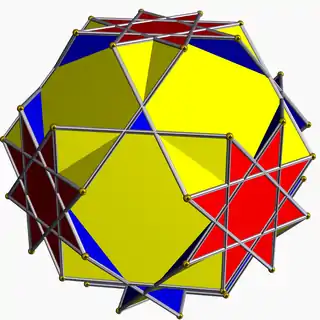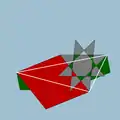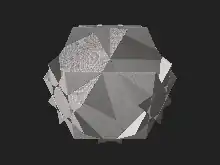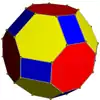Great truncated cuboctahedron
In geometry, the great truncated cuboctahedron (or quasitruncated cuboctahedron or stellatruncated cuboctahedron) is a nonconvex uniform polyhedron, indexed as U20. It has 26 faces (12 squares, 8 hexagons and 6 octagrams), 72 edges, and 48 vertices.[1] It is represented by the Schläfli symbol tr{4/3,3}, and Coxeter-Dynkin diagram ![]()
![]()
![]()
![]()
![]()
![]()
![]() . It is sometimes called the quasitruncated cuboctahedron because it is related to the truncated cuboctahedron,
. It is sometimes called the quasitruncated cuboctahedron because it is related to the truncated cuboctahedron, ![]()
![]()
![]()
![]()
![]() , except that the octagonal faces are replaced by {8/3} octagrams.
, except that the octagonal faces are replaced by {8/3} octagrams.
| Great truncated cuboctahedron | |
|---|---|
 | |
| Type | Uniform star polyhedron |
| Elements | F = 26, E = 72 V = 48 (χ = 2) |
| Faces by sides | 12{4}+8{6}+6{8/3} |
| Coxeter diagram | |
| Wythoff symbol | 2 3 4/3 | |
| Symmetry group | Oh, [4,3], *432 |
| Index references | U20, C67, W93 |
| Dual polyhedron | Great disdyakis dodecahedron |
| Vertex figure |  4.6/5.8/3 |
| Bowers acronym | Quitco |

Convex hull
Its convex hull is a nonuniform truncated cuboctahedron. The truncated cuboctahedron and the great truncated cuboctahedron form isomorphic graphs despite their different geometric structure.
 Convex hull |
 Great truncated cuboctahedron |
Orthographic projections

Cartesian coordinates
Cartesian coordinates for the vertices of a great truncated cuboctahedron centered at the origin are all permutations of
- (±1, ±(1−√2), ±(1−2√2)).
See also
References
- Maeder, Roman. "20: great truncated cuboctahedron". MathConsult. Archived from the original on 2020-02-17.